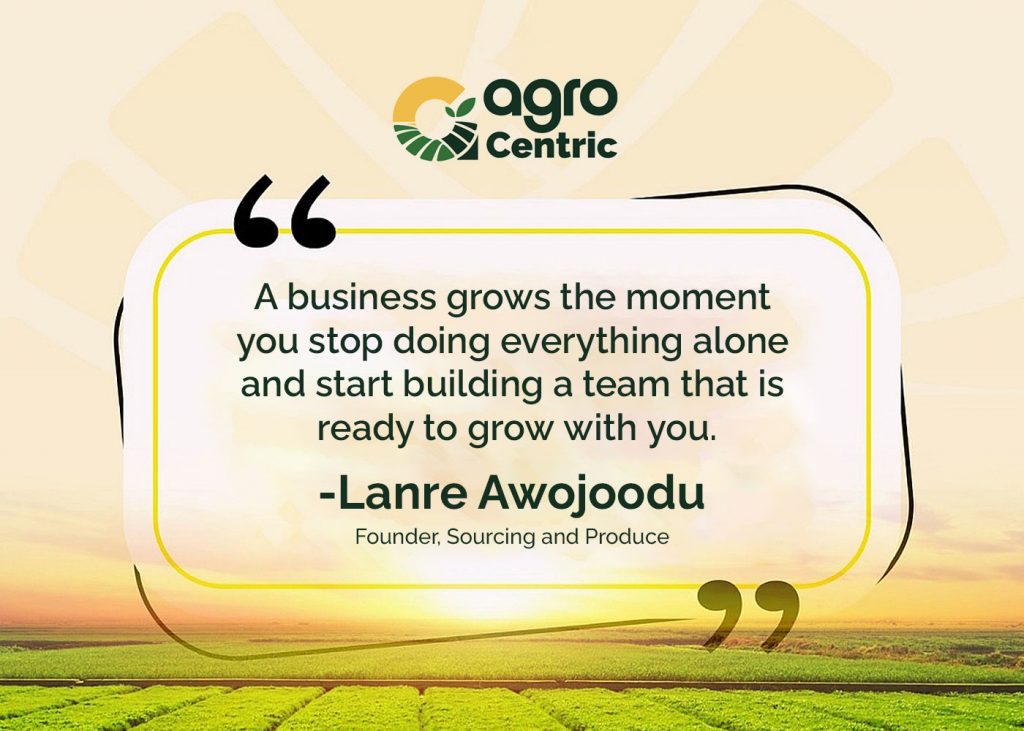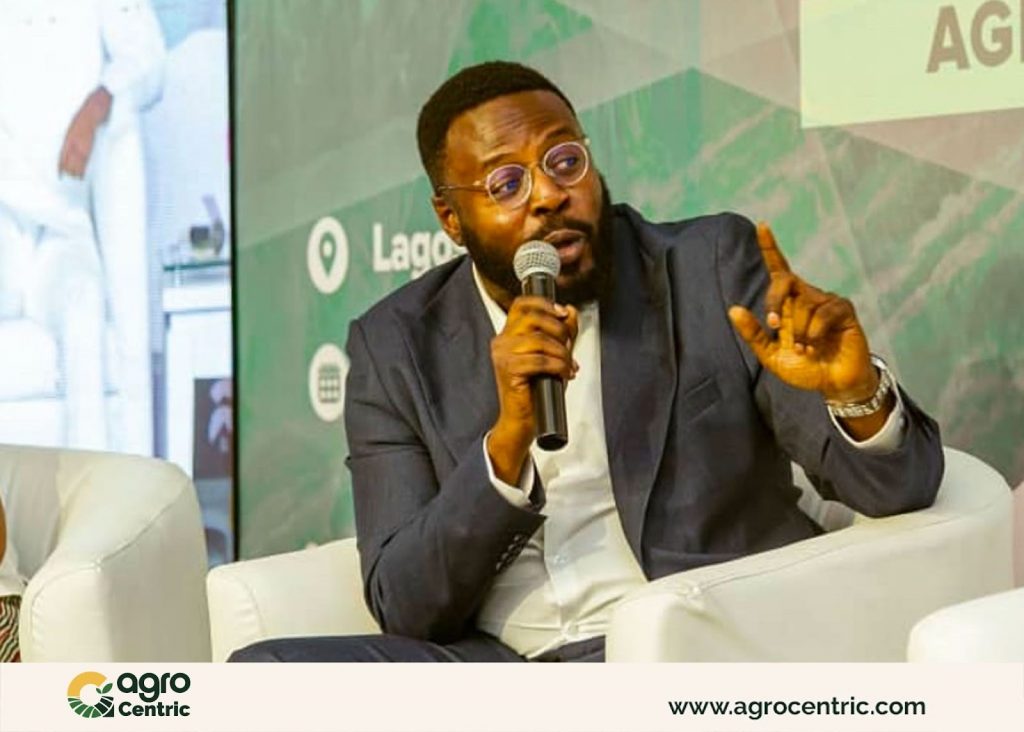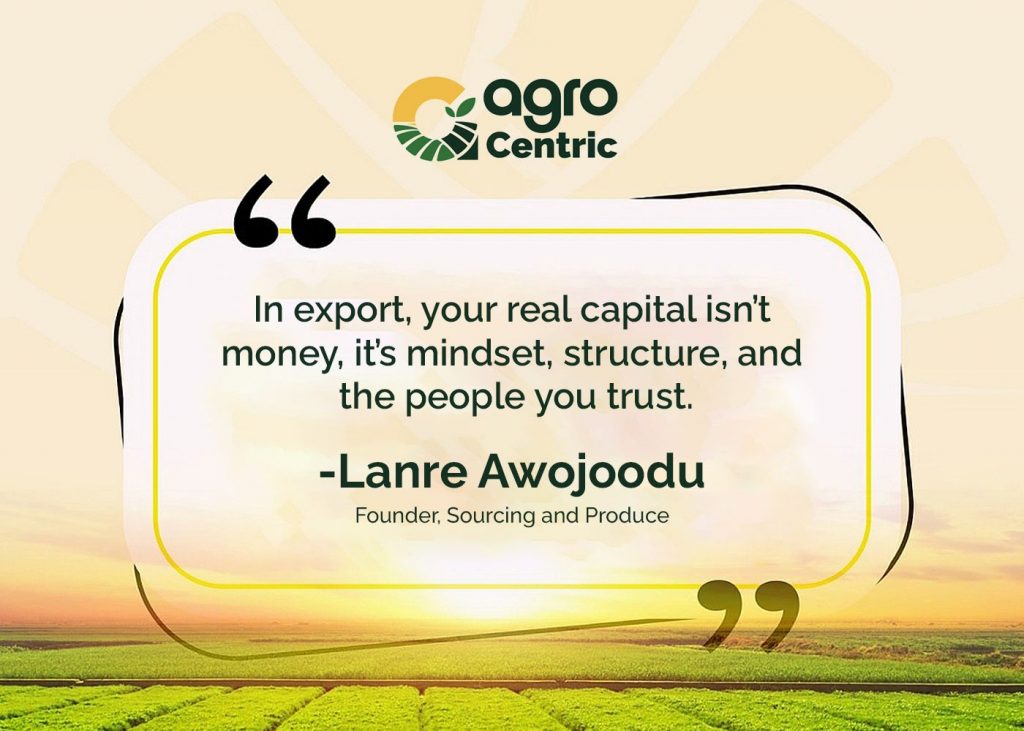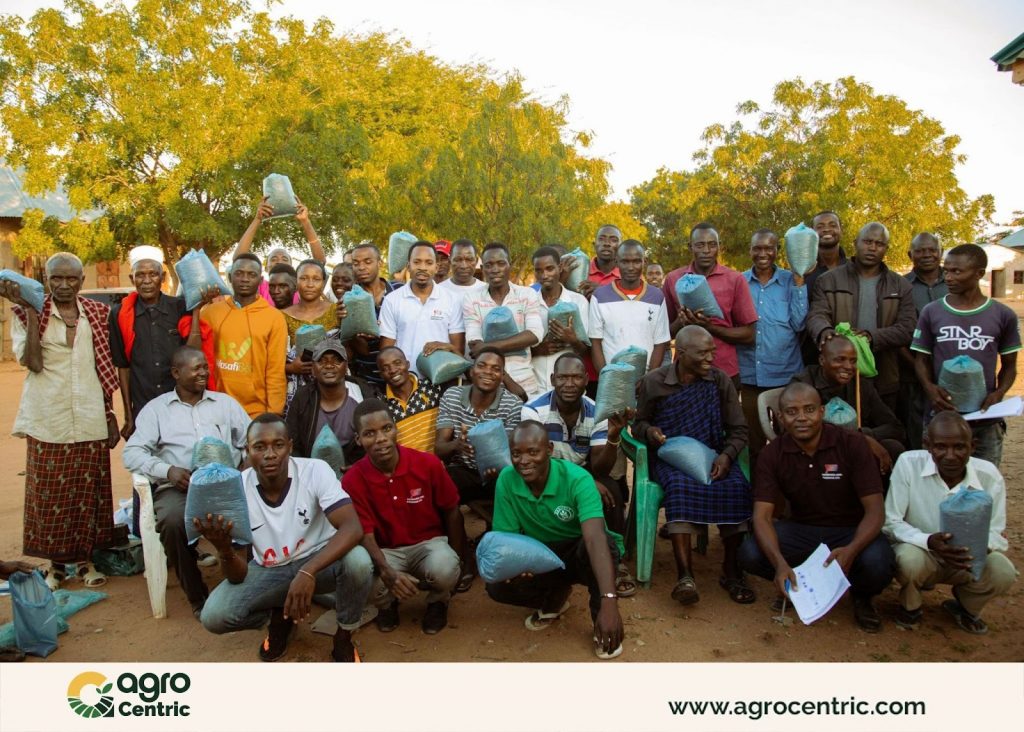
Nigeria’s agricultural export sector is full of ambition, yet many entrepreneurs never achieve significant success. Lack of capital, weak structures, unreliable partners, and poor logistics systems often stop businesses before they grow. For many, a single failed shipment or a bad season can be the end of everything.
Lanre Awojoodu’s journey from losing his first capital to building Sourcing and Produce, an export firm generating billions, illustrates that Africa’s agricultural transformation may start not with machinery, but with mindset, trust networks, and the courage to begin again after failure.
In this conversation with AgroCentric, Lanre shares the mindset shifts, financial challenges, and real-life obstacles from insecurity to port delays that have shaped his 15-year journey through Nigeria’s export industry.
Let’s begin with your story. Who is Lanre Awojoodu?
My name is Lanre Awojoodu. I’ve spent about 15 years working across Nigeria’s agricultural value chain, starting first as a farmer, then a local trader, and later as an exporter. My background is in accounting from the University of Lagos, but I’ve always leaned toward entrepreneurship. Over the years, I’ve built businesses, failed at some, rebuilt again, and eventually found my place in agricultural exports.
How did you come into the agricultural space?
I started with cocoa and plantain farming in Osun State. It wasn’t as exciting as I had imagined, mainly due to the long waiting periods before harvest, and I struggled with capital constraints. At one point, I needed ₦3.5 million and got several “no’s,” so I organised a small pitch event among friends and raised part of the funds.
From farming, I transitioned to local cocoa trading and later sought export buyers. My first supply to an exporter delayed payment for weeks, prompting me to explore exporting on my own. That led me to the Federation of Cocoa Commerce, where networking opened my first export opportunity. I later secured a better contract through a professional I connected with on LinkedIn.
Those early years were marked by steep learning curves, raising capital, navigating contracts, and figuring out the export process, but they laid the foundation for everything I do today.
Did your entrepreneurial spirit start early?
I studied accounting at UNILAG, but I knew accounting wasn’t my passion. I had always been entrepreneurial. In university, I ran a chicken-and-chips spot, sold clothes, and hustled to support my lifestyle.
During NYSC, I set up another chicken-and-chips joint at the Lagos camp and became one of the top-selling kiosks. I learned early that I struggled with delegation; I did everything myself. But those experiences shaped me.
I saved almost ₦2.7 million from these ventures. Unfortunately, I lost it all in a Ponzi scheme. That humbled me. I then secured a job and worked in various roles for about four years, including auditing, IT, and corporate operations. While working, I learned how companies develop and implement processes.
While working, I met a cocoa farmer. That conversation rekindled my interest in agriculture. I started a farm with ₦10 million, ₦7 million from an investor and ₦3 million of my own money. I was confident and thought I’d never be broke again. However, the business struggled, and I lost a substantial amount, ultimately leading to its collapse.

That must have been quite the learning curve. How did you move from that early struggle to founding Sourcing and Produce?
After the crash, I took time to reflect. I asked myself what worked and what didn’t. I realised I needed professionals on my team, even if it meant paying higher salaries. I also realised that a company reflects the mindset of its founder. So, when I started Sourcing and Produce during COVID-19 in 2020, I wrote down the lessons, processes, hiring, delegation, and structure, and built a stronger team. I had to find a way to get capital.
I started with seven employees, three in northern Nigeria for sourcing, one at the port, and others at the office. Food exports were still permitted despite lockdowns, and demand for spices such as ginger, turmeric, and hibiscus remained high. That year, we generated ₦520 million.
The following year, I challenged the team to double it, and we surpassed ₦1 billion. We’ve grown from eight employees to over seventy, across five African countries: Nigeria, Zambia, Tanzania, Malawi, and Liberia. We’re also establishing a presence in the U.S. and UAE, with revenues of more than $10 million cumulatively since 2020.

You mentioned that you faced capital problems; how did you manage to overcome them?
In 2020, a trusted supplier offered me four containers on credit. A buyer also gave a $50,000 advance. When the dollar rate rose before payment was made, my ₦6 million projected profit turned into ₦11 million. That deal gave me a financial breakthrough.
Later, my mentor, Mr Folabi Esan, introduced me to MBO Capital, a private equity firm. They trusted his recommendation and gave me a ₦30 million loan. I repaid it in four months. They increased it to ₦50 million, then to ₦70 million, and then to ₦120 million. Today, that credit line is worth over $1 million in the past 5 years. That partnership changed everything.
In your opinion, what is holding Africa’s agricultural exports back the most?
In Nigeria, the biggest issue is insecurity. Approximately 95% of farming for annual crops, such as onions, garlic, and ginger, occurs in Northern Nigeria. Insecurity affects farmer productivity, and at times, farmers are extorted.
On a general African scale, infrastructure is often lacking to prevent post-harvest losses. If you transport produce by road from Northern Nigeria to Lagos, it can take up to 3 or 4 days, or even 5 days, due to the poor state of the streets. This leaves the harvest susceptible to damage. We need the ability to cargo farm produce for same-day delivery, like taking a flight.
Do you have a personal experience that highlights the challenges related to infrastructure or policy?
Around 2021, the Apapa port was really congested. A container could spend one week on the road just trying to enter Apapa port, and then another two weeks inside the port due to the backlog, before it can be shipped. If you borrow money, those delays cost you. That’s why in Nigeria, you can only really do dry produce.
Another challenge is the credibility of farmers or suppliers. Some lack integrity; they might collect money from five different people for one container of ginger and only give you 20 tons instead of 25. They might also put stones in the bags. If you don’t clean and check, you end up sending stones to your customers, who will complain and could blacklist you.

What are the biggest misconceptions about agriculture and exports that young people should know?
Misconception 1: You must be a farmer. If you’re in agriculture, it’s a lie that you must be the farmer tilling the soil. The value chain is quite extensive, and I’ve always had farmers working on the farm for me. This misconception gives farming a bad reputation as manual, physical labour.
Misconception 2: You have to be close to the soil. There are opportunities in farming inputs, storage, cold storage, and transportation. In fact, the farther you are from the soil and the closer you are to the end buyer, the more profit you tend to make.
Misconception 3: Business is a get-rich-quick scheme. Business is a long-term game. You need the mindset that this is a career, and you’re in it for the long haul to gain that expertise and build those relationships.
How many agricultural produce items do you export, and to how many countries?
I have exported 16 agricultural produce items to 57 countries over the last 15 years. At Sourcing and Produce, we export a wide range of products due to our operations in five African countries. In Nigeria, we do hibiscus, chilli pepper, dry ginger, and sesame seeds. In Zambia, Tanzania, and Malawi, we handle beans, coffee, and pigeon peas. Our vision is to build Africa’s leading agricultural trading company.

Can you share a success story that exemplifies what you are striving to achieve as an organisation?
We give back to farmers a lot. We currently work directly with over 300 farmers, both within and outside Nigeria. We give them farm inputs, fertilisers, watering cans, and pre-planting training, and we sign agreements with them. Nothing is as essential to a farmer as having a guaranteed buyer for their produce. We have testimonies from women who work with us, approximately 50% to 70%, who report that they can now send their children to school and earn a steady income.
What was the hardest decision you’ve had to make in this journey?
Starting was the first big one, leaving a stable job as a newly married man. My wife and mother were understandably worried. But I knew I had to try.
The second hardest decision was starting again after failure. It’s one thing to start fresh; it’s another to restart after losing almost everything. But I learned that commitment makes the difference. When you’re genuinely invested, you don’t quit when things get tough; you look for solutions until it works.
How do you envision Africa’s role in global agricultural exports evolving over the next decade?
Africa has a natural advantage, arable land and favourable weather. Without us, crops like cocoa, ginger, chilli or sesame wouldn’t thrive globally.
However, we must first address infrastructure, security, and data. Much of Africa’s agricultural data is speculative. Without accurate information, we can’t plan or attract investors.
We also need to decentralise farming, not only in the North of Nigeria, but also in other areas. Every region should contribute. Once we combine safety, accurate data, and technology, Africa will not only feed itself, but also feed the world.
Thank you so much for a truly insightful conversation. You can learn more about Lanre Awojoodu and Sourcing and Produce, and discover how their model is transforming agricultural exports and empowering farmers across Africa.